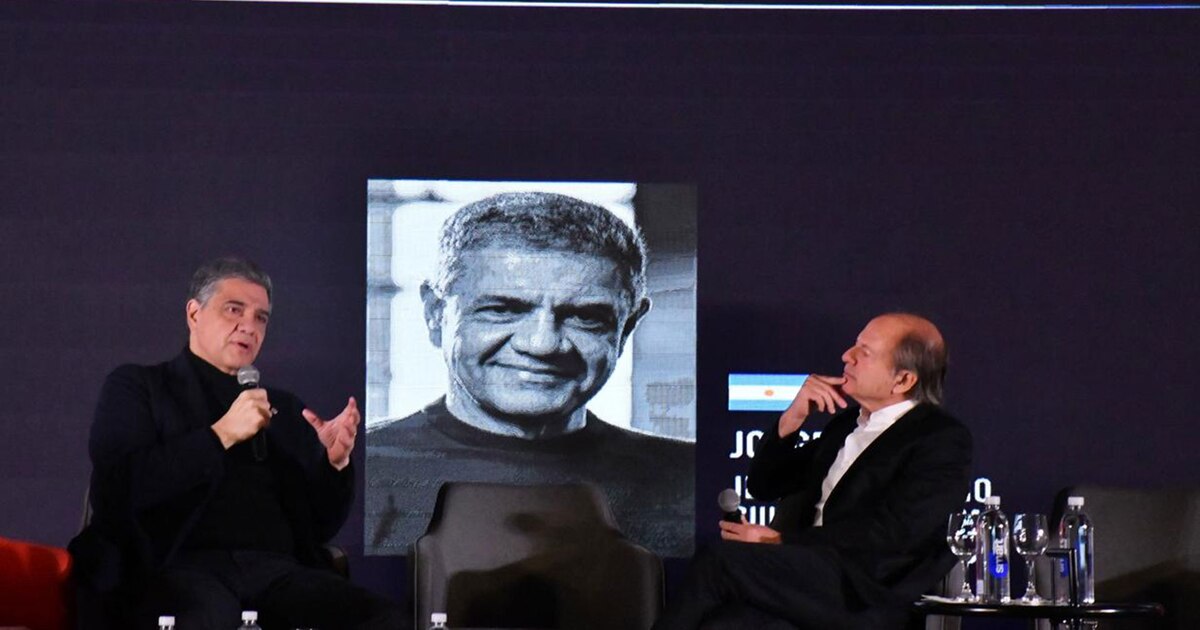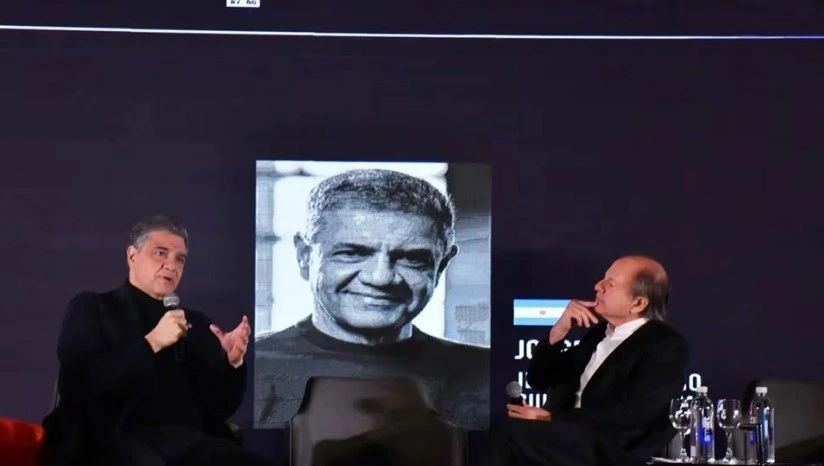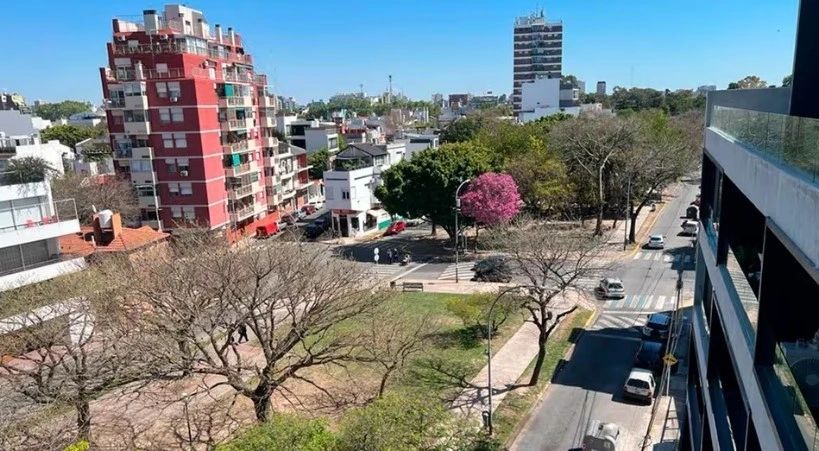BuySellBA
Administrator
Jorge Macri gave details of the new Urban Planning Code and sought to reassure businessmen: what will the Buenos Aires government seek? - Infobae

Sourcre:

 www.infobae.com
www.infobae.com
August 15, 2024
The head of the Buenos Aires City Government participated in the Real Estate Expo and referred to the possible changes that will come with the project sent to the Buenos Aires Legislature. It will define the way of building in CABA in the next four years.
By Jose Luis Cieri

The Head of Government of CABA, Jorge Macri, and Damián Tabakman, president of the Chamber of Urban Developers (CEDU) during the talk at the exhibition that brings together real estate developers and builders
Amid strong concerns from the business sector about the changes to construction that will come in the coming months with the new Urban Planning Code, the head of the Government of the city of Buenos Aires, Jorge Macri , participated this Thursday in the Expo Real Estate , the meeting that brings together businessmen, developers, builders and the protagonists of the real estate world, and sought to give a reassuring message about the plan underway.
In front of a packed venue and as part of the event that ends this afternoon at the Hilton Hotel in Puerto Madero, the head of the city government said that the objective with the update of the Urban Development Code (CUR) is to preserve the identity of each neighborhood without stopping development and economic growth. “ It is not about being in favor of one or against the other, but rather about balancing both. Our responsibility is to guarantee sustainable development,” he said.
These statements by Macri generated a certain calm in the sector, after the suspension of permits for construction and renovation of real estate projects in Buenos Aires for 180 consecutive days, or until the new Urban Planning Code (CUR) is approved, whichever occurs first. It was through DNU 2/24, which sought to protect low-rise neighborhoods (Low-rise Sustainability Units, USAB 1 and 2) from speculation, while the modification of the CUR is debated. The measures do not affect construction permits already granted or administrative acts in progress.
Another objective is to avoid indiscriminate construction and the hasty issuance of permits while the new regulations are being implemented.
This meeting seeks to generate business opportunities and establish alliances that boost the activity of a sector that in CABA has 5,020 companies that employ more than 83,000 people, including construction and real estate companies.
In his speech, Macri highlighted the three main axes of the modifications to the CUR sent to the Legislature. The first is to promote development in the southern part of the City through a system of incentives.
“There is a huge disparity between the north and the south. The south, which many consider unattractive, represents an aspiration for those who travel three hours to get to the city. Imagining living in Parque Patricios, Barracas or Soldati is very positive,” he said.
The project also aims to preserve the balance in each neighbourhood: increasing the density on the avenues and thus respecting the identity of each of the low-rise neighbourhoods. And, finally, the balance in the blocks.
Macri added: “We are going to protect the identity of the slums, but we also have to protect those who had already bought a property and could afford to do so. What I want is for everyone to trust and continue investing . ”
"We must sit down at a negotiating table, but always respecting the law and private property. Because what I want is for them to be successful," said Jorge Macri.

If the project to modify the CUR is approved, large buildings would only be built on avenues in Buenos Aires that allow it.
The head of the Buenos Aires administration was accompanied by the city's general secretary and secretary of international relations, Fulvio Pompeo , and the secretary of urban development, Álvaro García Resta .
Gabriel Brodsky , CEO of Predial, noted that this will improve over time, “but currently it is a slow process because many people do not qualify or have not yet found the property they wish to acquire, which delays the completion of the loan.”
The problem lies not in the bank's administrative processes, but in the difficulties of applicants in qualifying or finding the right property, which often delays transactions. Brodsky is optimistic and believes that this situation will improve over time, "increasing the number of completed transactions."
In addition, the talk at the exhibition discussed the priority of focusing development on the south of Buenos Aires, where the city government is seeking to build housing for the middle class in areas with growth potential, such as the area around the Olympic Village.
www.buysellba.com

Sourcre:

Jorge Macri dio detalles del nuevo Código Urbanístico y buscó tranquilizar a los empresarios: qué buscará el gobierno porteño
El jefe de Gobierno porteño participó de la Expo Real Estate y se refirió a los posibles cambios que vendrán con el proyecto enviado a la Legislatura porteña. Definirá la manera de edificar en CABA en los próximos cuatro años
August 15, 2024
The head of the Buenos Aires City Government participated in the Real Estate Expo and referred to the possible changes that will come with the project sent to the Buenos Aires Legislature. It will define the way of building in CABA in the next four years.
By Jose Luis Cieri

The Head of Government of CABA, Jorge Macri, and Damián Tabakman, president of the Chamber of Urban Developers (CEDU) during the talk at the exhibition that brings together real estate developers and builders
Amid strong concerns from the business sector about the changes to construction that will come in the coming months with the new Urban Planning Code, the head of the Government of the city of Buenos Aires, Jorge Macri , participated this Thursday in the Expo Real Estate , the meeting that brings together businessmen, developers, builders and the protagonists of the real estate world, and sought to give a reassuring message about the plan underway.
In front of a packed venue and as part of the event that ends this afternoon at the Hilton Hotel in Puerto Madero, the head of the city government said that the objective with the update of the Urban Development Code (CUR) is to preserve the identity of each neighborhood without stopping development and economic growth. “ It is not about being in favor of one or against the other, but rather about balancing both. Our responsibility is to guarantee sustainable development,” he said.
These statements by Macri generated a certain calm in the sector, after the suspension of permits for construction and renovation of real estate projects in Buenos Aires for 180 consecutive days, or until the new Urban Planning Code (CUR) is approved, whichever occurs first. It was through DNU 2/24, which sought to protect low-rise neighborhoods (Low-rise Sustainability Units, USAB 1 and 2) from speculation, while the modification of the CUR is debated. The measures do not affect construction permits already granted or administrative acts in progress.
Another objective is to avoid indiscriminate construction and the hasty issuance of permits while the new regulations are being implemented.
Opportunities
During the event, Macri participated in a talk moderated by Damián Tabakman , president of the Chamber of Urban Developers.This meeting seeks to generate business opportunities and establish alliances that boost the activity of a sector that in CABA has 5,020 companies that employ more than 83,000 people, including construction and real estate companies.
The decree stops the issuance of new urban certificates and suspends extensions for projects in USAB 1 and 2, without affecting the procedures already initiated
In his speech, Macri highlighted the three main axes of the modifications to the CUR sent to the Legislature. The first is to promote development in the southern part of the City through a system of incentives.
“There is a huge disparity between the north and the south. The south, which many consider unattractive, represents an aspiration for those who travel three hours to get to the city. Imagining living in Parque Patricios, Barracas or Soldati is very positive,” he said.
The project also aims to preserve the balance in each neighbourhood: increasing the density on the avenues and thus respecting the identity of each of the low-rise neighbourhoods. And, finally, the balance in the blocks.
Macri added: “We are going to protect the identity of the slums, but we also have to protect those who had already bought a property and could afford to do so. What I want is for everyone to trust and continue investing . ”
Preservation of apple lungs
The bill protects the existing lungs and, wherever they are built, prioritizes them, so that they are as large as possible. The plan of the head of government considers them an asset of the City because they are environmental reserves that improve the quality of life of all the inhabitants of Buenos Aires."We must sit down at a negotiating table, but always respecting the law and private property. Because what I want is for them to be successful," said Jorge Macri.

If the project to modify the CUR is approved, large buildings would only be built on avenues in Buenos Aires that allow it.
The head of the Buenos Aires administration was accompanied by the city's general secretary and secretary of international relations, Fulvio Pompeo , and the secretary of urban development, Álvaro García Resta .
Credits and expansion
Regarding the return of mortgage loans, Macri highlighted the proposal of Banco Ciudad for the purchase, improvement and expansion of homes. The entity has already granted 400 loans and there are thousands of applications pending, he said. However, although there is a lot of intention and will on the part of those interested, the transformation into concrete operations is still scarce.Gabriel Brodsky , CEO of Predial, noted that this will improve over time, “but currently it is a slow process because many people do not qualify or have not yet found the property they wish to acquire, which delays the completion of the loan.”
The problem lies not in the bank's administrative processes, but in the difficulties of applicants in qualifying or finding the right property, which often delays transactions. Brodsky is optimistic and believes that this situation will improve over time, "increasing the number of completed transactions."
In addition, the talk at the exhibition discussed the priority of focusing development on the south of Buenos Aires, where the city government is seeking to build housing for the middle class in areas with growth potential, such as the area around the Olympic Village.
www.buysellba.com

